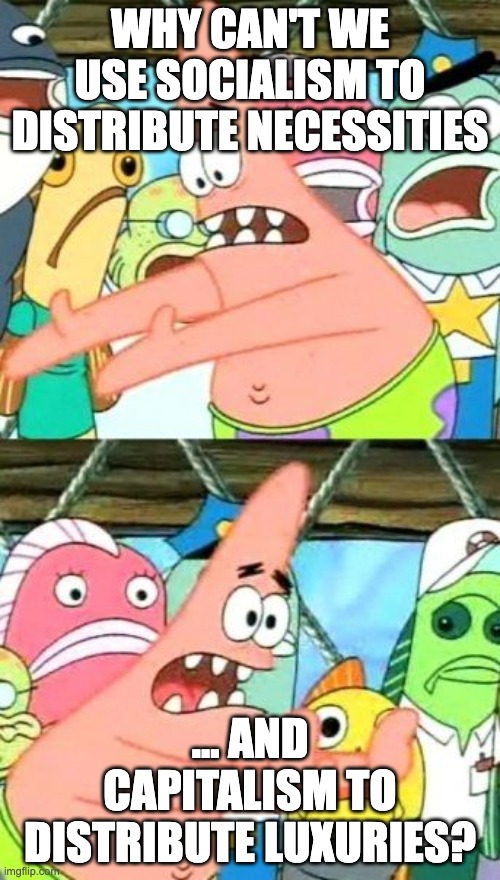Lmao, social media sites would be insanely worse if the employees made all the decisions. They would all be left-wing circle jerks, as if you all haven’t gotten unhinged enough.
What are you doing trolling on this site then?
Not trolling. Just wasting time chatting with people same as you.
Is this a communist post? I would live to see someone succeed with that idea but not realistic (see: history)
I took a look at history and see nothing but downside of capitalism: environmental crisis, homelessness, wealth inequality
But the alternative is like russia or something lol. Don’t discount the upsides to capitalism.
Dang I guess those are the only 2 options. It’s death cult capitalism or Russia.
Is there proof of otherwise? 😂
Never said that. Strawman
So you commented both ‘is there proof otherwise’ and ‘never said that. strawman.’ Which is it?
There are too many downsides that are too severe and won’t change unless we change the system. I suggest you research the successes of communism. The USSR accomplished a lot and there are other examples like Cuba
But the USSR is dead
Capitalism is just another step in the long line of governance systems throughout history.
Before now, feudalism, imperialism and monarchism were important steps to building towards the world we live in today.
Capitalism should not be the goal, it has many flaws and is not sustainable. Like it or not, communism is inevitable.
communism is inevitable
Or it could be something else who knows
Political theory points towards communism being the best and most likely outcome.
Things like UBI are going to be necessary soon due to AI.
Now strip the 1% of their wealth. What does that sound like?
 I can’t imagine you would want your house owned by anyone other than you. I certainly wouldn’t. The downsides are just bigger than the upsides.
I can’t imagine you would want your house owned by anyone other than you. I certainly wouldn’t. The downsides are just bigger than the upsides.what does that sound like?
Just saying UBI and stealing money from people (or “stripping their wealth” does not make communism? And I dont see how that could ever go well 😂.
I already live in a house I don’t own.
The real question is, would I prefer not to pay far out the ass to live here?
What are the downsides to living in affordable government accommodation, as opposed to paying for the house over thirty years, and giving the bank a small fortune in interest?
“UBI and stripping 1% isn’t communism”
Sorry, I forgot that redistributing the wealth from the 1% and providing everyone with equal opportunity is not the entire premise of communism. You’re right, my bad.
“I don’t see how that could ever go over well”
Yes… That’s the idea…
Communism works nice in theory, and in theory there is no difference between theory and practice, but in practice there is. But we e can definity re-shitproof internet based services.
Shitty people always ended up in charge and found a way to enrich themselves. Maybe in the far future once we have a true artificial intelligence, communism can truly work after they elect some unbiased AI (no skynet please) to be their leader.
If someone’s in charge, it’s not communism
Who will direct productions if someone not in charge of anything? Who stops bad actors from inciting their society into anarchy if no one wield any power to control the population?
The answer to both questions is the people themselves. We’re stronger together. No individual can stop the collective will.
That’s very noble but sadly I don’t trust humanity at current state to be able to do that. We’ll probably need to genetically engineer selfishness out of humanity’s gene pool before communism has any chance to success.
No, we don’t need eugenics to ensure socialism. People are plenty empathetic as it is. The biggest hurdle to true selflessness at the minute is living in a society that incentivises greed. And that is the fault of capitalism.
I don’t trust humanity at current state to be able to do that
Which is precisely why the first step of the communist experiment is Class Consciousness.
No, lol 😂
Listen, socialism doesn’t work.
What’s your definition of socialiam
Using socialism as a boogeyman by definition, is a poor argument. There are merits to many different economic systems, many of which have pros and cons, capitalism and socialism included.
The laugh, and “listen” while providing absolutely no reasoning demonstrates a certain level of arrogance, while at the same time demonstrating a lack of knowledge on the subject
Yeah I could have given arguments in the same comment.
You had two chances here and you didn’t. The platform you are on is brought to you by a communist.
Thank you for providing a great example of being confidently incorrect.
Do you have any example of working socialism?
Some of the richest countries in the world have a socialist framework in place lol. Norway, Switzerland, The Netherlands etc. You have no idea what you’re talking about.
That’s not socialism. That’s socdem. And it’s still capitalism
Oh you’re moving the goal post.
No that really isn’t socialism.
Socialist policies aren’t socialist? You’re either trolling or retarded.
None of those countries are socialist.
Those countries are actually capitalist, but with strong worker protections
Every single socialist country is an example of working socialism having lifted millions of people out of poverty, provided them with, food, housing education, and jobs. Meanwhile, we’re still looking for examples of working capitalism where majority of the population is not being exploited for the benefit of the capital owning oligarchy.
Wow. Read the rest of the thread because I’m not gonna rewrite stuff.
But as I was saying. I live in post communist country and the influence of socialism was extraordinarily destructive and I can see damage made from it to these days.
I grew up in USSR, and I lived through the collapse of USSR. It was one of the biggest humanitarian disasters in history. People who are cheering that on are the ones who benefit from all the exploitation under capitalism today. People who got theirs and don’t care about anything else. Deplorable.
Only a small percentage of socialists (albeit larger in this instance) hold the USSR up as anything but an example of an early, ham-fisted attempt at socialism with a lot of mistakes. If there have been no places socialism has worked yet (debatable, but I’ll argue from this position), that disproves nothing. The first several hundred tries at the lightbulb were probably failures, too, but capitalists talk about that failure as a side effect of innovation without realizing that social systems might need innovation too. I’m sorry if you suffered under an authoritarian socialist government; there’s nothing inherent about the connection between those two characteristics. But authoritarian governments tend to survive better against the kinds of conspiracies and attacks established capitalist governments launch against socialist ones, so you get to see what’s left. (If you don’t know about this, go to a library, start with…maybe Allende in ‘73…It’s very well-documented.). In sum, it has nothing to do with not caring about people harmed by authoritarianism. It has to do with seeing the evils of the system around us and refusing to accept that this is the best humanity can do. I’m sorry you can’t see that. But I’m not letting my friends’ access to insulin sit in the greedy hands of insurance companies without a fight. I’m not living in a pay-to-play political system where donors’ interests matter more than voters’ my whole life if I have anything to say about it. Regardless of your beliefs.
I think perhaps you meant to reply to the parent comment, I certainly did not suffer in USSR and the dissolution of USSR was a great tragedy in my view.
USSR obviously wasn’t the ideal of socialism. In fact, it would be pretty surprising if the first ever attempt at building a socialist society didn’t have problems. Obviously we can learn from USSR and do better going forward. However, I do think that despite all its problems, USSR did manage to achieve many positive outcomes for the majority of the people. It provided everyone with education, housing, healthcare, jobs, and all the necessities of life. This was done despite USSR having been under duress during its whole existence and it’s something that current capitalist regimes are unable to achieve.
“Lifted millions out of poverty”
Some people were effectevelly not much different from slaves up until 1970 as they had no passport, worked for food (oh, sorry, for workdays, which is even worse) and required permission to move from kolhoz. Ah tankies never change.
All wcommunists did for citizens is: lost the election, overturned it with force and forced millions of people back to medieval society with fancy goals.
NoT MuCh DifFeReNT FrOm SlaVes. Should really read up on what actual serfdom was like before the revolution instead of making a clown of yourself in public.
You are making the extraordinary claim, that despite socialism being used throughout the world, it simply doesn’t work. Therefore the onus of proof is on you. So, can you please describe why socialism doesn’t work?
Where. Give me an example of a socialist country
China, Cuba, Vietnam, and Laos are all examples of socialist countries today. China alone lifted over 800 million people out of poverty in recent decades. Compare that to the capitalist paradise in India.
China is a terrible example of a socialist economy, and the others are still mired by poverty. One could claim that is due to capitalist sabotage, but I don’t think it does socialism any favors to use them as success stories.
China is in fact an excellent example of a socialist country. Here’s a detailed explanation for you that’s well sourced and referenced https://www.youtube.com/watch?v=BT7Th2aV0wM
Does countries of Nordic model count? I heard good things about them.
Not really, Nordic model is capitalist because the capital owning class owns the means of production and holds power in society. Nordic model has generous social services and a social safety net, but that of itself does not make it socialist. A socialist model implies that it is the working class that holds power and that means of production are under a mix of public and cooperative ownership. This is the model that all western countries fight against.
Incidentally, I wrote a detailed article on the subject a while back https://justiceinternationale.com/articles/2020-12-02-we-must-own-our-tools/
Lol, enshitification of these services are happening because the owners want to extract as much money as possible from the users. Workers would do the same even if they owned it. How many people would turn down millions of dollars because users don’t like the change?
You must think that humans are inherently greedy and/or are projecting what you would do in a scenario where you’re part of a worker co-op. Most workplaces aren’t worth millions. Most folks who round themselves in a worker co-op would most likely try to better the operation for everyone.
I see you haven’t met my co-workers. Or my neighbors.
Yeah I’m not sure why it’s nowadays common to simplify socialism as “workers owning the means of production”. It’s not exactly wrong, but it is often misunderstood.
A company being owned by it’s employees is not necessarily “socialism”. In today’s global capitalist economy, there are worker-cooperatives as well, but they too exist within the capitalist economy and have to follow its rules, which is above all the profit motive. If you don’t orient yourself based on profit, you will be out-competed eventually.
Traditionally, when socialists talk about “workers owning/seizing the means of production”, they are not talking about individual workers or individual businesses.
Workers means “the working class”, which would be pretty much everyone (“the 99%”). Means of production means industry and the economy overall, not individual factories and businesses.
What makes FOSS special is that the software is not privately owned by anyone, not by the devs, not by a couple of programmers, not by a company. It is commonly owned, anyone can use, copy and alter the code however they want without any artificial barriers. This of course makes it a lot harder to extract money from users.
I’m realizing I may have misunderstood you, sorry! .
I think you might have replied to the wrong person?
In publicly-traded corporations, long term wealth extraction isn’t the goal. Getting sales up next quarter is. Employee-owned cooperatives are more likely to think long term. Plus, I’d vastly prefer to trust the average worker to do the right thing in a coop situation vs a manager doing it in a situation where they’re legally required (as standard publicly-traded corporations are) to prioritize the financial gains of shareholders above all other interests. Maybe you’ve lost so much faith in people that you think no one would ever choose to be slightly less rich for any reason. But plenty of people know there’s such a thing as enough, that there are interests as important as next quarter’s profits. They just don’t usually get MBAs.
Ah, yes, we can see it with all the communities running their own Mastodon servers and extracting the maximum of wealth from their users. /s
Yah, if workers own a tiny portion of the means of production, as they do now in various co-ops around the globe, they will be either (1) required to operate on the basis of profit in order to outcompete entities that are not worker-owned, or (2) cease to exist because they get outcompeted by those who operate on the basis of profit.
This forces all existing co-ops to behave in line with capitalism as a whole. The point is to overcome that system of socio-economic relations: When calls are made for workers to own and operate production, as in this meme, they mean that the class constituted by workers — the proletariat — should be in control of all productive means. Not just that some workers should start co-ops, for this primary reason.
The idea that owners would sacrifice their profits if their business were merely a co-op is, I agree, not necessarily true. (Though workers in co-ops who are directly connected to the point of value production would definitely be more willing to sacrifice profits for decisions that enhance social value.) The point, however, is to move beyond an economy owned and operated for profit and forge a society in which profit is not the basis for operation in the first place. If, for example, workers’ needs were guaranteed, the impetus for profit-seeking would evaporate, though will not be absent, at least while the artifacts of capitalist society persist in us and our institutions.
Amazing how many people will step in to defend the ownership of everything to a small minority. They will not reward bootlicking yet yall continue.
Look, they’re just temporary inconvenienced billionaires.
What I learned from observation is that they tend to believe that, one day, they will be part of the “small minority”. The American Dream!!!1
“It’s called the American Dream, because you have to be asleep to believe it”
As if workers give a shit about customers.
I’m reminded by that guy on TikTok
“You just lost a customer”
“Good”
You skipped over the part where he says “You think I own this business? You think I own IKEA?” implying he would care if he actually had any skin in the game which he would if his job operated as a worker co-op.
Co-ops are still capitalism.
Co-ops can be capitalistic and are capable of functioning under capitalism, but they would also work much the same under any market economy. Decisions and would be profits are democratized/socialized.
Capitalism is a system of capital accumulation with the people who own the means of production hiring workers to operate them. Co-ops are a market economy, but they’re demonstrably not capitalism because capital is distributed fairly amongst the workers doing the work. Learn the difference between markets and capitalism.
Unsurprisingly, those who manage their own small business and aren’t at mercy of a giant corporation do. So…🙄
Workers don’t give a shit about customers because that’s how the incentive system is set up. Give workers the profits, you give them a good reason to give a shit about how clients feel.
As well as ensuring those profits will keep flowing through their retirement, and you get the long term planning incentive.
That would be an improvement actually, because the customers of these companies are not users, they are other companies looking to advertise or buy users personal data. The users of for profit social media are in fact the product, not the customers.
Great counterpoint. This is what Reddit has been missing for the last 6-8 years: actual thought instead of regurgitation.
They do when they work in a cooperative and have a stake in the business being successful.
My question is always: so if me and 10 other people have a great idea for a business, where does the money to start it come from? Most businesses take years to turn a profit, so in this collective, are we all just pouring in our savings until it takes off?
What if we all bust ass for 3 years, never getting paid because we’re building the product, we launch and start getting orders, and find that we’re getting a lot more orders than we expected, so we hire / bunch of people to help fulfill orders. Do those new hires all get an equal share, even though they weren’t there for the 3 years of unpaid R&D? Do they have to contribute money when they get hired for the share of the building that the rest of us already own?
I’m all for workers rights, and workers standing together collectively to get fair wages and working conditions, but when people say “workers should own the means of production”, they can never seem to explain how that would actually work.
Simply, the central bank can play the role of a VC where people with great ideas apply for loans or grants.
You expect a bank to make high risk loans to unproven ideas? What about loans did things which are controversial (think dispensary or brewery)?
Yes, I expect the state bank to make loans for unproven ideas. This isn’t nearly as outrageous as you seem to think. State funding in China is used precisely in this way to stimulate businesses in areas where China wants to advance right now. And if a dipensary or brewery was seen as socially necessary and viable they could get a loan like anybody else.
Two things stand out about this comment:
You’ve framed the idea of worker ownership in the context of profit maximization. It’s important to keep that in mind when running a business because you gotta know how your opponents are thinking and making decisions, but the point of worker ownership isn’t profit but instead agency.
I find it hard to believe that in always asking this question no one has ever answered with an overview of the different collective ownership forms that have existed throughout recorded human history or even a brief synopsis of how your country’s corporate law structures allow for it.
This is what I think every time I see this socialist / capitalist dichotomy set up:

also I know Im not using the meme right.
Allowing capitalist relations to persist, even if basic goods like food and homes were nationalized, enables a society in which capitalist profiteers continue to operate. History shows pretty explicitly that Capital will use the levers of power that exist, like The State, to eat away at or overturn any socialistic advances. E.g., suddenly the luxury capitalist corporation that sells idk, pearls, is lobbying (bribing) their way into privatizing beaches from which they operate. Slowly but surely the socioeconomic relations produced under capitalism foment and claw their way back to their former position. This requires a constant, indefinitely revolutionary society to keep capitalist relations at bay; that sort of momentum is not possible to sustain, certainly at the current moment.
It’s necessary to abolish capitalists as a class because leaving capitalist systems of relations alone enables them to continue to re-produce themselves.
That doesn’t preclude this sort of dual-economic setup from being a good thing, just insufficient.
yeah I guess from my point of view all the systems for distributing resources and power ‘fairly’ fail on their own. Mostly because they usually silo power in 1 or 2 mechanisms, so power concentrates and corrupts over time.
Also from a systems engineering standpoint -I dislike ‘purity’. I prefer blended systems with backups and counter-measures. If I want to know which systems work best I look at what is delivering the best results and right now for me thats the nordic socialist democracies which still have plenty of capitalism.
Im not saying we’ve arrived at the best and should stop improving, but Im not interested in the endless hypothetical arguments about which ideology would be best if perfectly implemented. They are never perfectly implemented so best design something that can withstand reality.
I mean, we first need to define what a luxury and what a necessity is. For some things like food, shelter, water, healthcare it’s pretty straightforward. But for resources like energy or communications it’s less obvious.
I’d argue that the internet is now a necessity rather than a luxury, but many people to this day still don’t have or choose not to have internet access (due to geography or religion). Energy is the same way, if we take an obviously bad example, but say you’re socializing electricity for everyone, what’s to stop someone from mining cryptocurrency on everyone else’s dime ? That person would be profiting off of the social net. Where do we put the cursor between “luxurious” energy use and “necessary” energy use ? It’s a tough thing to figure out.
Furthermore, for most people you need an incentive to work, right now it’s survival, which is not great, but if all of your needs basic, and more are taken care of by the state, you only work for the luxuries, which would greatly reduce the available workforce. It’s again a tough balance to find.
If you’re socializing electricity for everyone then you can tell when usage is far outside norms and audit usage
I also don’t think money is the ultimate incentive, and most people would work whether or not they needed money to survive. Sure they wouldn’t work at some crappy unfulfilling job, but people would still be productive according to their idea of productivity.
Also not having people working all these useless jobs would save energy and resources.
There’s lots of study on how humans respond to incentives and money and its not a straightforward relationship at all.
This is some LibSoc thinking. See: in early USSR days when they tried more worker-cooperative based ownership they had to stop because the factory workers kept just immediately selling their factories for money now that they owned them.
Uh… No.
Goes without saying. Look at the profits of the companies providing essential resources like energy. They most certainly didn’t let a good crisis go to waste.
Workers should control the beans of production.
Rise up! Seize the beans of production!
Rice up*
today I learned an important new word
Not that I disagree but please define what “should” means in that sentence.


















